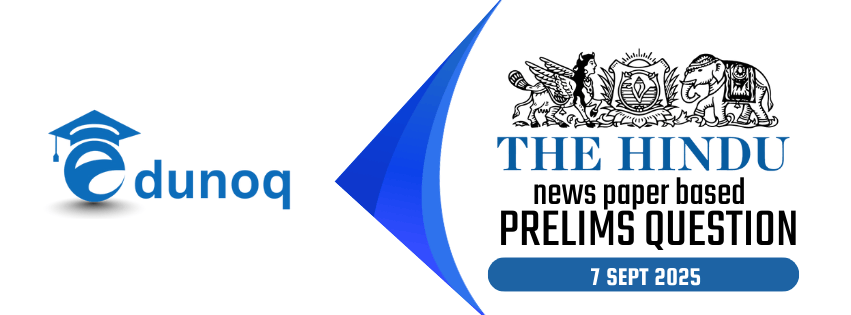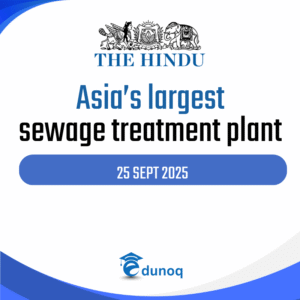The Hindu Bassed UPSC prelims Q&A :
Economics
The dispute settlement mechanism of WTO is often in the news because:
a) It enforces climate change agreements
b) It resolves trade disputes among member countries
c) It regulates global currency flows
d) It manages IMF lendingProtectionism generally refers to:
a) Free movement of goods and services across borders
b) Government policies restricting imports to protect domestic industries
c) Liberalization of trade tariffs
d) Promotion of foreign direct investmentGlobal supply chain disruptions during the pandemic highlighted:
a) Complete independence of developing economies
b) Resilience of world trade
c) Vulnerability of economies dependent on imports
d) None of the above
Geography
Indian Ocean Dipole (IOD) influences:
a) Atlantic Ocean currents
b) Monsoon rainfall in India and East Africa
c) Pacific Ocean El Niño
d) Himalayan glacial meltWhich of the following is a direct impact of climate change on agriculture?
a) Increased soil fertility
b) Erratic rainfall and crop failure
c) Stabilized monsoon cycles
d) Expansion of desert lands onlyThe “String of Pearls” strategy is often associated with:
a) Chinese presence in the Indian Ocean
b) Indian trade routes in Southeast Asia
c) US alliances in the Pacific
d) European naval expansion in the 19th century
History
The Berlin Conference of 1884–85 is significant because it:
a) Ended the Cold War
b) Partitioned Africa among European powers
c) Created the League of Nations
d) Initiated the Marshall PlanDecolonization after World War II was accelerated by:
a) Strengthening of colonial empires
b) Rise of nationalist movements and global anti-colonial sentiment
c) Collapse of UN institutions
d) Spread of communism in Western EuropeGandhi’s method of struggle differed from other nationalist movements because it emphasized:
a) Armed revolution
b) Non-violent civil disobedience
c) Industrialization first
d) Alliance with colonial rulers
Science & Technology
Chandrayaan-3 mission is primarily related to:
a) Mars exploration
b) Moon exploration
c) Solar observatory
d) Space station developmentArtificial Intelligence is often associated with:
a) Predictive analytics and automation
b) Renewable energy generation
c) Deep-sea exploration
d) Food grain productionCRISPR technology is used in:
a) Climate forecasting
b) Genome editing
c) Nanotechnology
d) Cybersecurity
Political Science / IR
Multipolarity in global politics refers to:
a) One dominant superpower
b) Two dominant superpowers
c) Multiple centers of power
d) Absence of any power structuresThe African Union is modeled broadly on:
a) NATO
b) European Union
c) UN Security Council
d) Non-Aligned MovementThe UN Security Council has how many permanent members?
a) 3
b) 5
c) 7
d) 10
Answer Key is

Answer Key
Economics: 1–b, 2–b, 3–c
Geography: 4–b, 5–b, 6–a
History: 7–b, 8–b, 9–b
Science & Technology: 10–b, 11–a, 12–b
Political Science / IR: 13–c, 14–b, 15–b
How The Hindu Newspaper Optional Questions Help UPSC and Other Govt Exam Aspirants
Preparing for UPSC and other government exams in India is not an easy task. Every aspirant knows that current affairs, analysis, and practice play a very big role. Among all the sources available, The Hindu newspaper is considered the gold standard for serious candidates. It provides deep coverage of national and international issues, economy, polity, environment, and social topics. But simply reading the news is not enough. Aspirants must practice with questions. This is where The Hindu Based UPSC prelims Q&A becomes very important.
In this article, we will see how questions framed from The Hindu help aspirants prepare for UPSC mains, prelims, and even optional papers. We will also discuss how the habit of solving The Hindu Based UPSC prelims Q&A regularly builds confidence, improves analytical skills, and helps in revision.
Why The Hindu is trusted by UPSC Aspirants
The Hindu is known for its balanced reporting and editorial depth. Unlike other papers which focus on sensational news, The Hindu covers policy decisions, government schemes, Supreme Court judgments, international diplomacy, climate change, and socio-economic issues in detail. These are the same areas from which UPSC frames its questions.
Therefore, when aspirants solve The Hindu Based UPSC prelims Q&A, they are not just practicing random GK. They are actually revising the same topics which appear in the actual exam. For example, if The Hindu covers a WTO trade dispute, a Q&A can be framed on WTO reforms. If there is news about climate change, a geography or environment-based question can be prepared.
Benefits of Practicing The Hindu Optional Questions
Improves Current Affairs Coverage
Reading news is passive. But when aspirants attempt The Hindu Based UPSC prelims Q&A, they actively recall facts, concepts, and analysis. This strengthens memory.Makes Revision Easy
After one or two months, it is very difficult to revise old newspaper notes. But a set of The Hindu Based UPSC prelims Q&A acts as ready-made revision material.Prepares for Both Prelims and Mains
While prelims focus on objective questions, mains require analytical writing. Optional subjects also demand depth. Practicing The Hindu Based UPSC prelims Q&A helps aspirants develop both fact-based and analytical thinking.Exam-Oriented Practice
UPSC is not about mugging up every news detail. It is about identifying relevant issues. The Hindu Based UPSC prelims Q&A saves time by converting news into exam-style questions.
How to Use The Hindu Q&A in Daily Study
First, read the newspaper headlines.
Identify important topics from economy, polity, science & technology, and international relations.
Solve the The Hindu Based UPSC prelims Q&A prepared from these topics.
Note down mistakes and revise them weekly.
This approach creates a cycle of reading → practicing → revising. Over time, aspirants see a huge improvement in their recall and answer-writing skills.
Examples of Questions
From The Hindu report on Indian Ocean climate change, a geography question can be:
“Discuss the impact of changing monsoon patterns on agriculture and livelihood in India.”
From news on WTO reforms, an economics-based question can be:
“Critically examine the role of the WTO in the present global trade order.”
When aspirants solve such The Hindu Based UPSC prelims Q&A, they not only revise the issue but also understand the exam angle.
Building Analytical Skills
UPSC is not only about facts. It tests critical analysis. When students attempt The Hindu Based UPSC prelims Q&A, they learn how to connect one news item with larger themes:
WTO → Globalisation → Indian economy
Monsoon → Climate change → Food security
Supreme Court judgment → Constitutional morality → Democracy
This habit makes answer writing much more effective in mains and optional papers.
Motivation and Discipline
Another hidden benefit is discipline. Reading the newspaper daily is a habit. But sometimes aspirants read without focus. When they have to attempt The Hindu Based UPSC prelims Q&A, they read carefully because they know questions will be framed. This increases seriousness and motivation.
Relevance Beyond UPSC
It is not just UPSC Civil Services Exam. Other government exams like State PCS, SSC, Banking, RBI, and CAPF also ask questions based on current affairs. Practicing The Hindu Based UPSC prelims Q&A gives aspirants an edge in all these exams. Since the base is strong, they can answer confidently.
Common Mistakes to Avoid
Over-relying on summaries: Some aspirants skip reading The Hindu and directly attempt The Hindu Based UPSC prelims Q&A. This reduces depth. Both must be done together.
Not revising old Q&A: Questions should be revised weekly. Otherwise, memory fades.
Ignoring mains-style analysis: Even though these are prelims-based, aspirants should think about mains angles as well.




